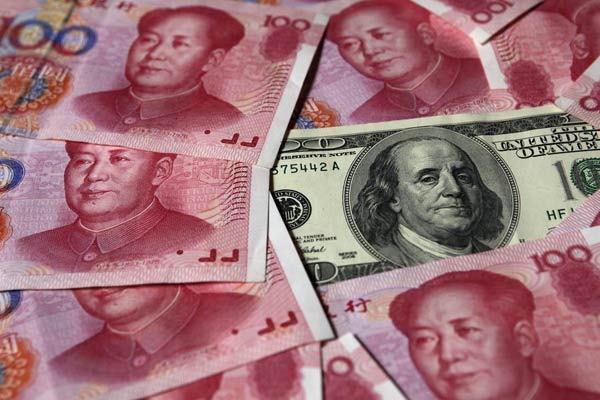A $100 banknote is placed next to 100 yuan banknotes in this October 16, 2010 file picture illustration taken in Beijing. [Photo/Agencies]

SAFE to improve management of foreign debt and capital flows to promote account convertibility
China's foreign exchange regulator said on Thursday that the country will further promote liberalization of its capital market and gradually achieve convertibility of the renminbi under the capital account.
Guo Song, head of the capital account management department at the State Administration of Foreign Exchange, said at a news conference in Beijing: "The SAFE will improve the management of foreign debt and capital flows under a macro-prudential framework and deepen reforms in key areas such as direct investment and securities investment."
The administration, he said, is carefully tracking the operation and management of the foreign exchange funds of multinational companies as well as foreign exchange management policies in the China (Shanghai) Pilot Free Trade Zone, and will promote such experiences to the rest of the country.
"A series of reforms on the management of foreign exchange in the capital account will be launched," he said.
The regulator has steadily pushed forward relevant reforms over the last few years.
Around 85 percent of the 40 subcategories in the capital account have become partially or fully convertible, according to the SAFE.
Reform efforts have been focused on alleviating financing difficulties and reducing financing costs for foreign and domestic companies.
So far, nearly 800,000 foreign-invested enterprises have been established in China and more than 25,000 Chinese companies have expanded overseas, said Wang Yungui, head of the SAFE's general affairs department.
China has simplified procedures for foreign debt registration, allowing non-bank borrowers to open accounts and make drawdowns, conversions and repayments directly after they register their foreign debt with a local SAFE office.
The nation has also simplified the regulatory regime for cross-border financing by relaxing most of the existing regulatory restrictions on cross-border guarantees, in a move that is seen as helping both Chinese companies to raise offshore funds to support their overseas operations and foreign enterprises invested in China receive loans from Chinese banks at lower prices.
Earlier this year, the SAFE eased controls on foreign exchange conversion for equity investment by foreign-invested enterprises established within 17 pilot zones, including the China (Shanghai) Pilot Free Trade Zone and Suzhou Industrial Park.
Wang said: "Since the start of 2014, the renminbi's exchange rate has been experiencing the new normal of two-way fluctuation. As a result, some companies have chosen to deposit their export revenues into foreign currency accounts rather than converting them into renminbi."
November's foreign exchange settlement by banks amounted to $145.5 billion and sales amounted to $155.4 billion, leaving a $9.9 billion deficit.
"Under these circumstances, it is normal that China experienced capital outflows for a few months, as it adapted to the opening up of its financial market. The SAFE will keep tightening its supervision of capital flows of foreign exchange," he said.
Guan Tao, head of the SAFE's department of international payments, said in October that China is not at risk of large-scale capital outflows although it experienced a net outflow under the capital account in the third quarter, which was in line with the nation's target of achieving equilibrium in the international balance of payments.
Statistics from the SAFE showed that China saw a deficit of $81.6 billion in the capital and financial accounts in the third quarter while posting a current account surplus of $81.5 billion.
